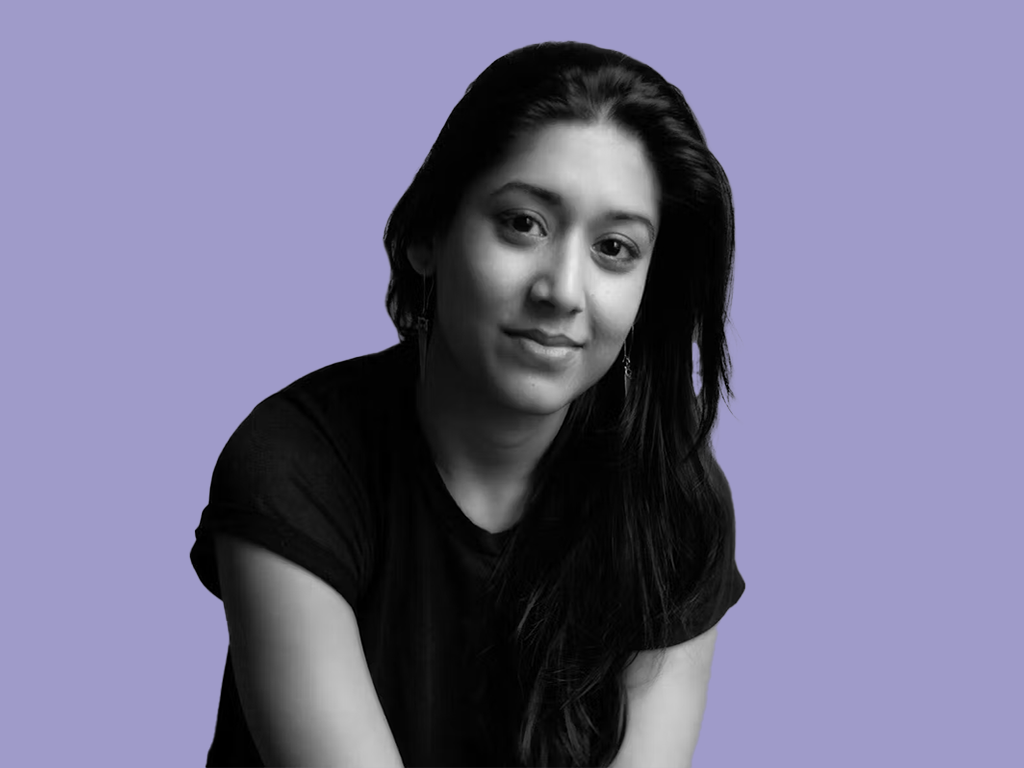I've been watching a lot of older movies in quarantine, so I was happy to have the excuse to take a break and dive into something new. I started "Stray Dolls" with zero expectations and came out the other side pleasantly surprised. It takes some of my favorite outlaw movies, like "Bonnie and Clyde" (Penn, 1967) and "Badlands" (Malick, 1973), and applies a feminist lens to the most outdated tropes. Critical opinion is pretty split on this one, but I'm willing to go to the mat for it. The ideas are fresh and well-executed, there are many Dolly Parton nods, and Geetanjali Thapa's performance alone is worthy of a lengthy discussion. Should you watch it? Absolutely yes.
Here's more information on the film before we hop into the interview with director and co-writer Sonejuhi Sinha.
Vibe:
This is a relatively bleak movie, with a few humorous moments sprinkled throughout. The first poster I saw had me convinced that it was going to be like "The Heat" (Feig, 2013) or some other buddy-cop action movie, but that's not the tone at all. While the violence is played straight, it's never gratuitous. Sinha is not interested in making this the most bloody, disgusting film on the planet. The violence serves the narrative but it's not the most interesting aspect of the film.
Best time to watch:
Right now. My big takeaway from the film is that (surprise!) the American dream is bullshit. The idea that anyone can come to this country and succeed by working hard is no longer even remotely realistic. The elected (lol) officials and systems in place are only meant to benefit those with deep pockets. The "America first" mentality has never been more deeply ingrained thanks to Trump and his constant stream of xenophobic bullshit. "Stray Dolls" provides some insight into how this gross mentality harms immigrants and the economically disenfranchised.
Worst time to watch:
If you're feeling depressed by everything that's going on and want a lighthearted distraction, this isn't it. I spent a few weeks avoiding anything serious for this exact reason, but now I'm really leaning into it. Time your viewing accordingly.
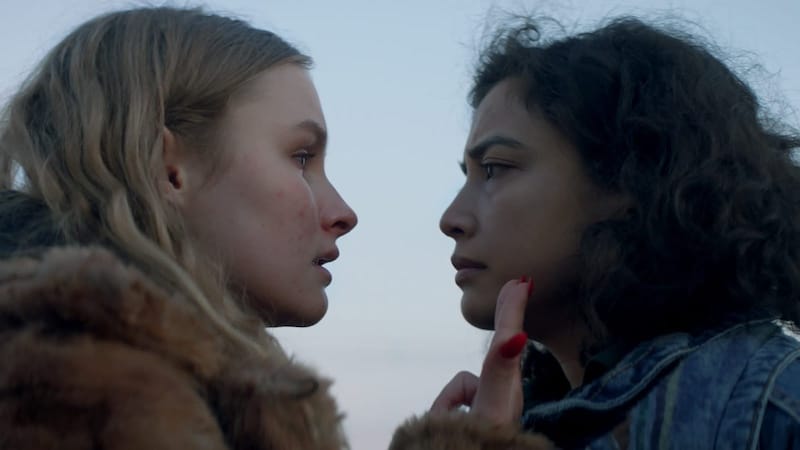
Where to watch:
"Stray Dolls" is streaming free on Tubi.
Quick Summary:
After coming to the US in hopes of better things, Riz (Thapa) falls right back into the life of crime that she hoped to escape. She secures a job as a housekeeper at a shitty motel where shady activity abounds. The proprietor Una (Cynthia Nixon) clearly does not have her best interest at heart. Her roommate Dallas (Olivia DeJonge) immediately holds her at knifepoint and demands that she steal something valuable to cement the relationship. As hard as she tries to change her life, outside forces push her back to square one.
If you haven't seen the film and don't like spoilers, you should probably stop reading at this point. I ask Sinha some specific questions about the film that might be annoying for those who haven't seen it.
Interview with Sonejuhi Sinha
Woman in Revolt: I hate to even ask about this because I'm sick of talking about it, but how has COVID-19 impacted the "Stray Dolls" release?
Sonejuhi Sinha: We had a five-city theatrical release planned out for early April – New York, LA, Boston, Phoenix, and Cleveland. Initially, we were worried that it was going to be delayed, but it was totally canceled because we were unsure of when things would open back up again. We went straight to a streaming VOD release. It was disappointing at first because of course, especially with a feature debut as a first-time filmmaker. You make films to have a conversation with the audience; to get critics to take you seriously; for your film to join this canon of filmmaking. With that gone, it almost feels like a tree falling in a forest where no one hears it. I'm trying to be optimistic. Given that everybody is home and looking for stuff to stream, my position is... why not make art and storytelling available? I hope it reaches an audience regardless of this entire situation.
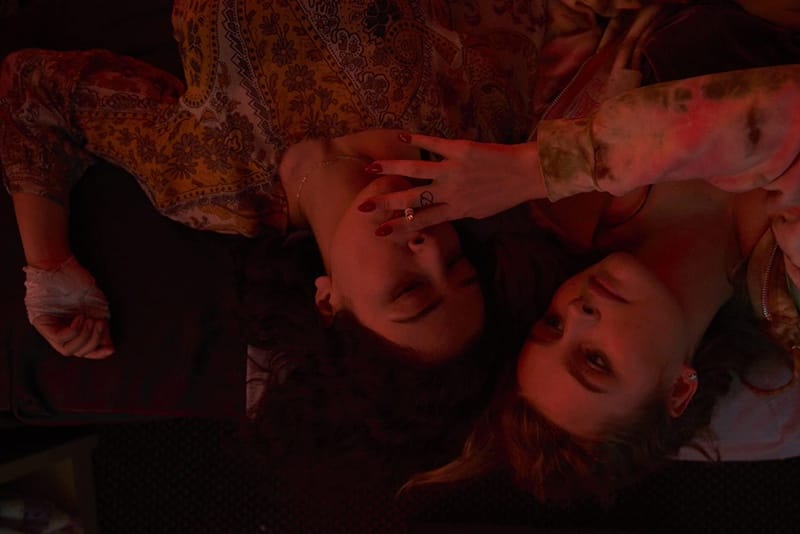
I hope that there are some residual benefits. I don't know how it will impact awards season, but maybe this will be the year that there are more women nominated. Several films with women at the helm have been released straight to VOD. [Academy rule changes were officially announced a few days ago.]
I do know several people are working on appeals to get awards committees to change their policies. This is such an unprecedented scenario. A lot of films just do the theatrical release so they can be in consideration for awards. With that component completely taken away, they'll just have to adapt to this new reality.
Why did you want to tell this story for your first feature? I would love to hear about your writing process with Charlotte Rabate.
I started with a short film that I wrote and directed in 2014 called "Love Comes Later." It premiered at the Cannes Film Festival and is about an immigrant in a motel who happens to commit a crime for the purpose of survival. Once that premiered, I was invited back to the labs at Cannes to develop it into a feature. As I was working on it, I realized I wanted to expand the world and play with some genre elements in a subversive way with a character we hadn't seen before. My collaborator and co-writer, Charlotte, was the producer on the short film. We had already worked together on several projects, so I knew that she was the perfect person to help me write the script.
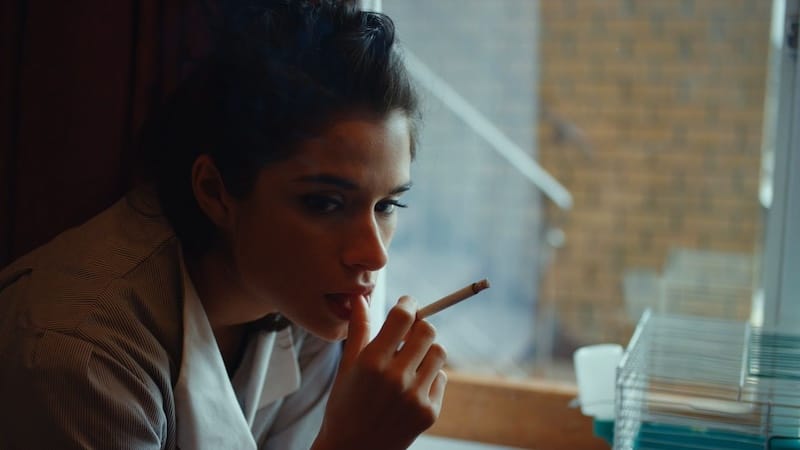
I wanted to have a central character who's an Indian immigrant and an outsider in America, along with a very all-American character. We created Dallas, a runaway from the South, who is sort of on the same seesaw as Riz. They're both outsiders in a motel that is full of outsiders. Una is an immigrant as well, but she's the type who came over when she was four or five, so she has more opportunity... She owns the motel. She's almost a Trumpian figure in this dynamic who believes that since she pulled herself up by her bootstraps, so should you. We wanted to create these outsider characters who live in the gray areas between good and bad.
Up until now, I had seen a lot of films with women or women of color characters who played either a) the pitiable victim type who is solely preoccupied with her day-to-day survival or b) the criminal (as portrayed by the news media). I saw these two extremes but nothing in the middle that allows us to explore a complex character from the female gaze – their sexuality and these other aspects beyond survival that make them human. That was the goal.
Setting it at an American motel was also important... that's where the short was. I have this fascination with motels. In the '50s and '60s, middle class America would stay at motels for a vacation. They were portrayed as this idyllic and wholesome setting for the entire family. Now, 70-80% of motels are immigrant owned. Motels have sort of become a metaphor for immigrants resuscitating America. Creating an environment where complex characters could collide is something we were playing with. We wanted to use all of that to say something about America now – in terms of class, race, and socioeconomic status.
Were there Annie Taylor references throughout the film? I know she's explicitly mentioned at the end, but I also thought of her when Dallas pulled out a heart-shaped cocaine mirror. Taylor had a heart-shaped pillow with her when she went over the falls.
There were some tiny things planted. Riz has a scratch on her forehead, as well (Annie Taylor survived with just a scratch on her forehead). It's almost this leap of a dream that is completely impossible that both Annie and Riz target. We wanted there to be a parallel between them, for sure.
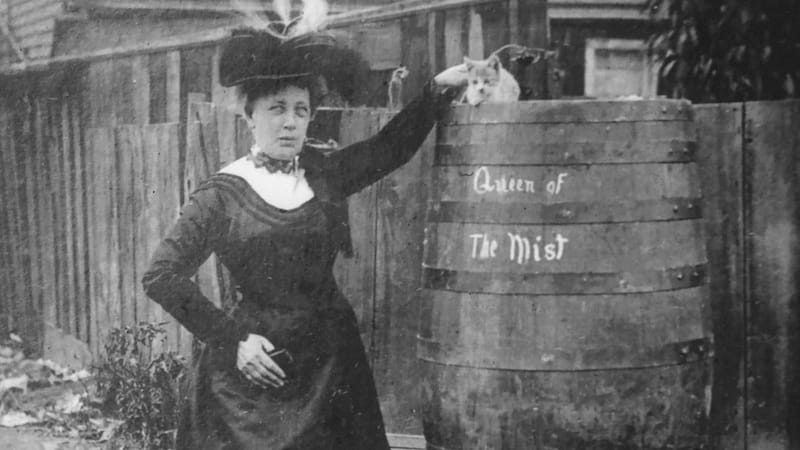
I was also thinking about how Taylor did this wild thing and came out of it with a great story that she struggled (and failed) to monetize. That feels very appropriate considering Riz and Dallas' fate.
We chose Annie as a symbol for Riz and Dolly Parton for Dallas. We used these models that they dream about to show something about them.
I had a totally different conception of the characters when they were first introduced, but then they slowly proved me wrong over the course of the film. We don't get too much backstory on them, but little tidbits of information that add to their complexity and make them feel fully formed.
With Riz, I felt like women of color get put into such a small box and get to do so little. We rarely explore their desire or sexuality but here is Riz, who's queer and has an interesting and unlikely partnership and friendship with Dallas.
There wasn't any explicit discussion of their sexuality in the film, which I appreciated. I hate when films feel the need to moralize or define queer sexual interactions.
Charlotte and I wanted to make sure that we came at the story from a post-modernist perspective where ethnicity and sexuality were incidental (in a way). The film wasn't about coming out or Riz's immigrant status, although we wanted to touch on all of these different facets of the human experience. There are films that explicitly focus on the immigrant experience or the coming out experience. While those are important, we wanted to switch the lens and consider it a bit differently.
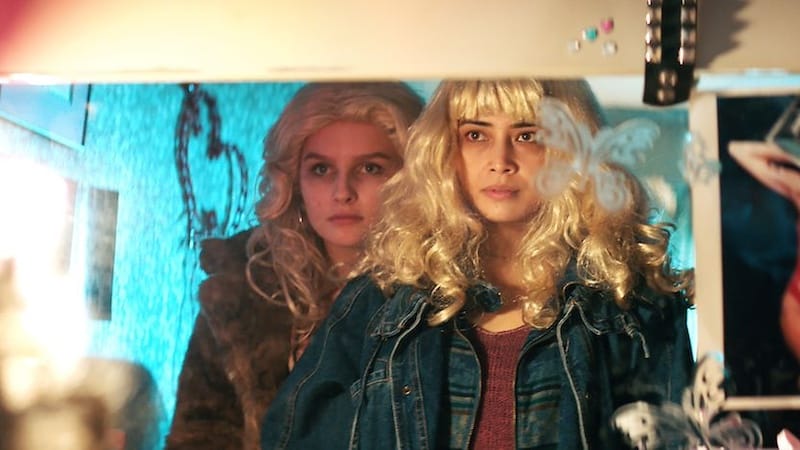
One scene I keep thinking about is when Riz first meets Sal (Samrat Chakrabarti), the guy with the cocaine brick. He arrives when she's in the midst of stealing his cocaine and is initially pretty nice. He offers her some chai and speaks to her in Hindi. I started to feel kind of bad for him, but it dissipated quickly after he propositioned her. It's a nice snapshot of misogyny and the way that women feel like they need to apologize for things... that they can't be quick to judge.
Samrat Chakrabarti is an incredible theatrically trained actor. In talking to him about the character, I was like... yes, he's going to say these lines that may seem creepy to people but deep down, he's lonely. Together we worked on finding the humanity for Sal. Even if you're a criminal, there are so many layers to what makes you human. We leaned on that humanity so that he could then say something despicable. He's so lonely that all he wants is for someone to share chai with him. That's true for a lot of immigrants. My parents carry their tea leaves everywhere they go; it's really important. Sal sees someone who is brown and gets excited. It's a manifestation of his loneliness but... he's also a creep.
Men prove every day that it's possible to be both!
After Sal dies, there's a parallel moment where Riz finds a photograph of his daughter. Finding out that he was a father adds another layer. There's guilt involved, even though he's an antagonist.
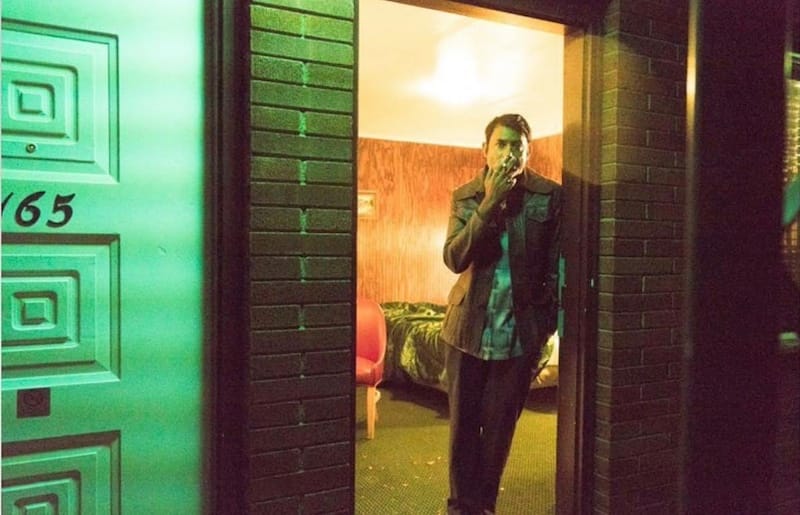
I wondered a lot about how you decided on what backstory details to reveal for Riz and Dallas. We get a little bit of explicit information, but a lot of it is inference. How did you figure out what balance to strike?
I wanted a story that felt like it was unfolding in an active way. In early drafts, we did lean a lot on backstory. We even did one draft with flashbacks in India. We decided that if we could successfully hook an audience to go on this ride with Riz and Dallas, it could be the driving force. Whatever comes out in between would be great and accentuate the characters even more, but we did make a conscious decision not to include too much exposition. We wanted to lean on the kinetic, immediate story unfolding as soon as these two characters meet.
On the flip side, it also created an opportunity for the audience to see some aspect of their own immigrant experience in Riz. There's the scene in the phone booth where she talks to her mom. Almost any person who's lived abroad away from their family can relate to some aspect of that... calling home and lying about how okay they are when they are clearly not. That's a very universal thing. We tried to add in details like that to let people recognize something familiar.
I did work with Geetanjali Thapa, Olivia DeJonge, Cynthia Nixon, and Robert Aramayo [who plays Jimmy] very specifically to come up with backstories for the actors, they just weren't in the script.
I hate to say this because I love her deeply, but I thought the leads were so fantastic that they made Nixon's performance a little forgettable. I hadn't seen either of them [DeJonge and Thapa] in anything else, so their performances were more exciting to me.
They're both so incredible. The casting process was a bit harrowing for us. To find Riz, we were first looking in the US at a lot of Indian-American actors. Something in the pit of my stomach told me that this approach wasn't quite right. There's a difference between Indian-Americans and someone who has just arrived from India. I wanted to cast somebody from Bombay, so we started looking in India. Every indie producer we talked to was like, "Do not do this. It's the worst decision ever. You'll never get the visas in time and it will delay production." We took the risk, and Geetanjali's O-1 visa was approved four days before shoot.
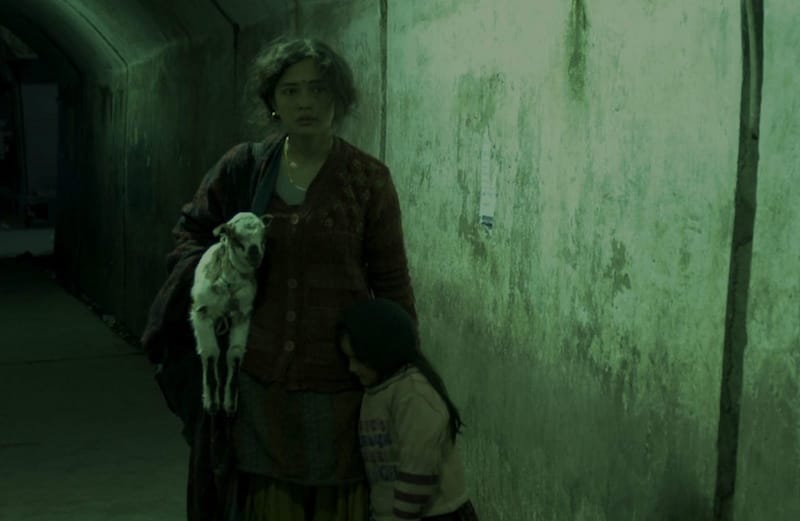
Geetanjali was so perfect for the role. She's phenomenal in this film called "Liar's Dice" (2013), which was at Sundance and Cannes a few years ago. She plays a Nepalese character who travels to India. She brought so much grit and real fatigue with her from Bombay, which made everything come alive. Olivia, too... I could tell when I Skyped with her that she had the essence of Dallas.
How did Nixon get attached to the project?
She came on more towards the end. We already had Geetanjali, Olivia, and Robert. We sent her the script and she loved it. I think she found it exciting to play opposite an actress who was flown in from Bombay and had completely different training and techniques. She's won two Tony awards and brings such a range and depth to her work. She elevated us all to perform at a high bar.
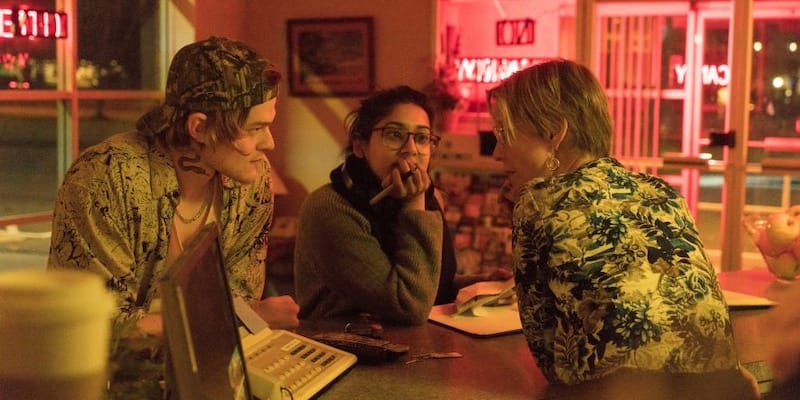
In all of my short films, I've worked with established actors and non-actors. I like that mix because each of them challenges the other. Non-actors bring so much truth of what they're living through – their circumstances, grit, and real life. The actors, of course, try to lose any trace of acting because they want to feel completely real. In this case, Geetanjali was also an incredible actress, but with a different background and approach.
Speaking of training and background, can you tell me a little bit about Tribeca's Through Her Lens program?
It's an incredible program for filmmakers. You submit a short for consideration and then they select five filmmakers. They put you through a week of developmental bootcamp. We had all of these speakers and mentors throughout that week – Catherine Hardwicke and Dee Rees (writing), Rashida Jones (production), and Arianne Phillips (costume design). We got to sit with all of these amazing people and hear about their filmmaking experience. Because it's a small setting, you get to know the mentors personally. They read your work and give feedback. I did that workshop just before directing my first feature. It was a great network of women supporting other upcoming writer-directors. It also comes with $5,000 of development money, too.
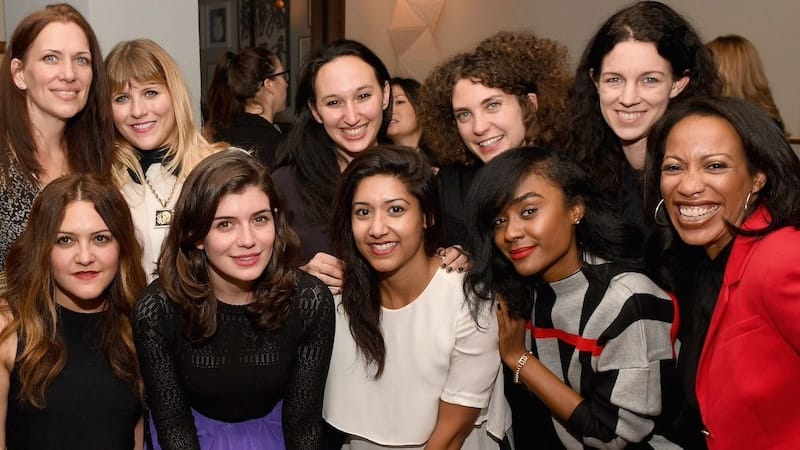
Were there any other things in your career that you found helpful or that you would recommend to new filmmakers?
I got into filmmaking through editing and working with a lot of directors. Tribeca All Access is another great program. It's almost like a dating app, but with producers. They put you in touch with twenty producers who you have meetings with to pitch your project and hopefully get money and support. I would also recommend the Jerome Foundation. We got a grant from them. The Sundance Institute is another good resource. I recommend checking out all of those and making shorts. That's how I honed my craft as a writer/director. I would make shorts on the weekends and work on editing at night. With each short, you become more confident.
Since we're all in quarantine, I feel like I have to end this interview by asking if you've watched anything good lately. Movies and TV are the main vices getting me through this.
I saw "Portrait of a Lady on Fire" (2019) just as we were getting into quarantine. It's such a phenomenal film with a special and unique voice. The two actors bring it all to life in a heartbreaking way... the female gaze in full effect. I have a one-year-old, so I haven't been able to watch as much as I want to.
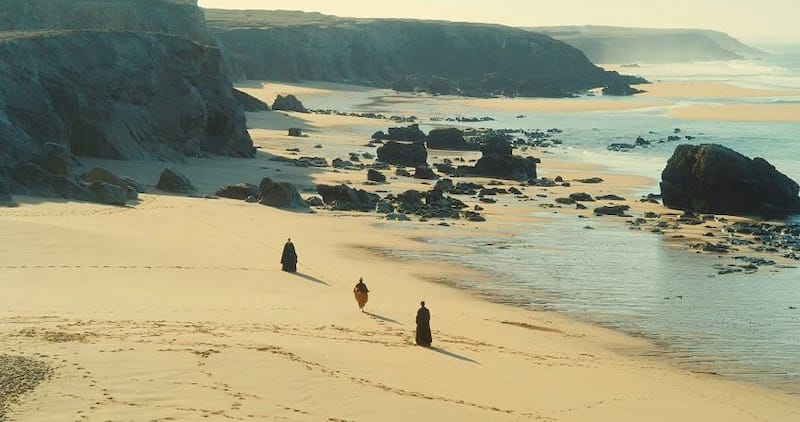
Lately I've been reading about Genghis Khan, a ruler with many daughters who were trained warriors that he basically used to acquire more territory. They were all very well-versed and strategic in helping him lead the empire.
Is the Genghis Khan stuff for a project?
I'm reading about it out of curiosity, but maybe it will turn into a project. I have been writing a lot. I'm working on a pilot for a TV show that Charlotte and I are creating. It's set in a motel, but this time it centers around the Indian-American owners. It deals with some of the immigrant tropes, along with the crimes that keep intertwining them. It will have more levity than "Stray Dolls" and some bits of dark humor, but it's definitely a drama/crime story... somewhere in the ballpark of "Ramy" meets "Breaking Bad."
I would definitely watch that. Can't wait!
I urge you to add "Stray Dolls," streaming now on VOD, to your quarantine movie list. If you want to keep up with Sinha, check out her website or give her a follow on Twitter. FYI: "Liar's Dice," which Sinha mentioned, is currently available on Netflix. "Portrait of a Lady on Fire" is on Hulu.

